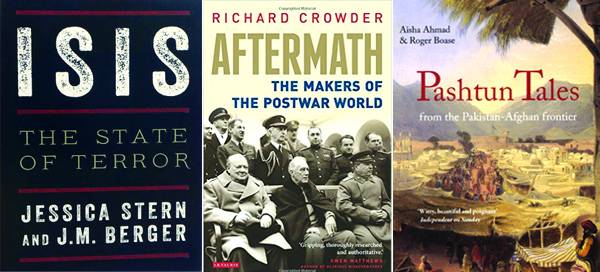
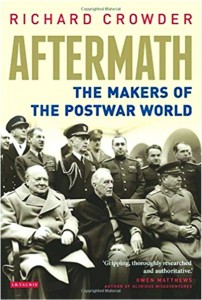
Aftermath: The Makers of the Post-War World
Richard M. Crowder
I.B. Tauris (Hardcover), 2015
PRs 4720
In a decade, between 1940 and 1950, the old world order collapsed, and a new one was created. Old European empires - France, Germany and the United Kingdom - receded, replaced by two new superpowers - the Soviet Union and the United States. Beyond Europe, a swath of new countries was created: India, Communist China, Israel and the modern Arab states, Indonesia, the Koreas. But there were darker shadows too, cast by the onset of the Cold War: the failure to establish international controls on atomic energy, or the growth of the national security state and modern intelligence apparatus. This era also produced some of the most remarkable statesmen of modern times, including leaders such as Roosevelt, Churchill, Stalin, Truman, de Gaulle, Nehru and Mao Tsetung; diplomats like George Marshall, Dean Acheson, Anthony Eden, Ernest Bevin and Robert Schuman; and international fixers, such as Averell Harriman, John Maynard Keynes, or Jean Monnet. Their stories form the core fabric of this book. Richard Crowder examines their shared ambition to rebuild the world, and launch a second age of globalization.
What people are saying: “This is scholarly history written for the ordinary reader: highly accessible, filled with insight and as exciting as a thriller while based on solid research. Read it with pleasure.”
(Christopher Catherwood, author of Winston’s Folly)
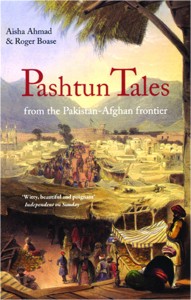
Pashtun Tales
Aisha Ahmad and Roger Boase
Viva Books (Paperback), 2010
PRs 790
The book is a collection of Pashtun tales collected from the city of Peshawar, the capital city of Khyber Pakhtunkhwa. Because of its geographical position on the crossroads linking Central Asia with India and beyond, Peshawar and its province had been one of the busiest land routes throughout the history. Since time immemorial caravans of fortunes, as well as simple mendicants (faqirs), had traversed the city on their way from Central Asia to the rich and famous India and beyond, and on their way back. As such, it has been a meeting point of different cultures and traditions. The city of Peshawar boasts of its old part, known as the qissakhwani bazaar, “the bazaar of storytellers” whose fame had reached throughout the northwestern India and beyond. It is from this historic city that most of the tales in this book come from. However, Aisha Ahmad writes that “despite Peshawar’s reputation as a meeting place for storytellers, in 1977, when I asked a friend to find me a professional reciter of tales, he was unable to find one anywhere in the city or in the neighbouring villages. Even after months of searching, he had only found people who knew one or two stories”.
This shows the impact of electronic media on the local culture and the domination of radio and television in the daily life of the people. The book constitutes a welcome and valuable addition to the recording of this region’s folktales and a good contribution to the comparative analysis of this genre. With an excellent folkloristic analysis at the end, authors have demonstrated how these tales, and their themes and motifs, participate in a wider sphere of tales common throughout the region and beyond.
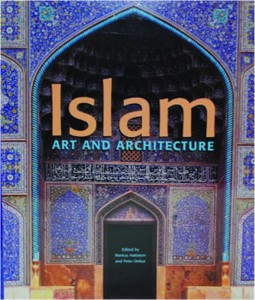
Islam: Art of Architecture
Markus Hattstein and Peter Delius
H.F.Ullmann (Hardcover), 2013
PRs 3000
Islam, the second largest and the youngest of the major world religions, has changed the world and left its mark on human history since the appearance of the prophet Mohammed in the seventh century. This book follows the historical development of the Islamic dynasties and regions, showing the variety of their forms of artistic expression from the beginning until today. From decorative elements of buildings to calligraphy and the embellishment of everyday objects, ornamentation, that most characteristic Islamic art form, is displayed in an extraordinary rich range of ways. The contributions of important scholars bring this culture to life, which belongs next to Greek and Roman antiquity as one of the pillars of our modern society.
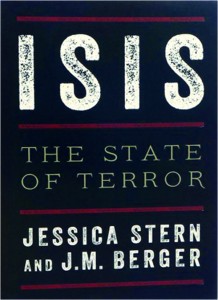
ISIS: The State of Terror
Jessica Stern and J.M. Berger
William Collins (Paperback), 2015
PRs 995
The Islamic State, known as ISIS, exploded into the public eye in 2014 with startling speed and shocking brutality. It has captured the imagination of the global jihadist movement, attracting recruits in unprecedented numbers and wreaking bloody destruction with a sadistic glee that has alienated even the hardcore terrorists of its parent organization, al Qaeda.
Jessica Stern and J.M. Berger, two of America’s leading experts on terrorism, dissect the new model for violent extremism that ISIS has leveraged into an empire of death in Iraq and Syria, and an international network that is rapidly expanding in the Middle East, North Africa and around the world.
ISIS: The State of Terror traces the ideological innovations that the group deploys to recruit unprecedented numbers of Westerners, the composition of its infamous snuff videos, and the technological tools it exploits on social media to broadcast its atrocities, and its recruiting pitch to the world, including its success at attracting thousands of Western adherents. The authors examine ISIS’s predatory abuse of women and children and its use of horror to manipulate world leaders and its own adherents as it builds its twisted society. The authors offer a much-needed perspective on how world leaders should prioritize and respond to ISIS’s deliberate and insidious provocations.
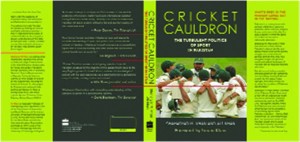
Cricket Cauldron: The Turbulent Politics of Sport In Pakistan
Shaharyar M. Khan and Ali Khan
Harper Sport (Hardcover), 2013
PRs 1495
Pakistan is a country beset with politicised instabilities, economic problems, ethnic conflicts, religious fervour and crises of identity. It is also a country in which the game of cricket has become a nationwide obsession. How has that happened? How does a Muslim country, jealous of its independence and determined to forge a Pakistani identity, so passionately embrace the alien gentleman’s game imported by the distant and departed former colonial masters? What do we learn of Pakistan from its attitudes and responses to cricket? This book sees Pakistan – its history, politics and society, not to mention its fractured relations with India – through the prism of cricket. Shaharyar Khan examines how this very Western sport came to embed itself into the psyche of Pakistanis old and young, and how understanding the state of cricket in the region is the key to understanding Pakistan itself.
Demonstrating how the turbulence around cricket has much wider political implications, Khan provides an unusual and highly original perspective on Pakistan. This book will fascinate general readers and cricket enthusiasts, at the same time proving essential reading for observers of Pakistan, India and the South Asia region.

